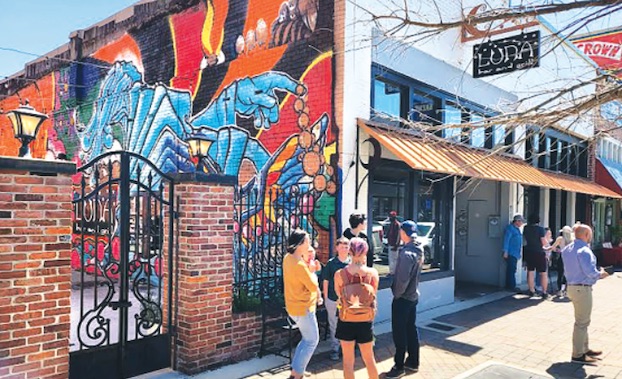Supply chain woes: Locals share how current conditions have affected their businesses
Published 1:13 pm Tuesday, March 22, 2022

- “Nothing prepared me for this, for the world shutting down,” said Dave Evans, owner of Luna Bar & Grill, above. (Rita LeBleu / American Press)
Supply chain issues continue to impact the world economy. This month, experts on the front lines of local businesses told how the pandemic and supply chain issues have affected them, thereby impacting customers across Southwest Louisiana.
The business-to-business program, with speakers Amanda Cox, Latter & Blum; Dave Evans, Luna Bar & Grill; Chad Seales, Rouses Market and Wendy Stine, Stine Home & Garden, was presented by the Better Business Bureau, Serving Southwest Louisiana Foundation.
“Housing is an incredibly heavy topic that affects all of us,” Amanda Cox began.
She presented some eye-opening statistics showing the contrast in the residential real estate market between January 2019, when there was still some sense of normalcy and January 2022. Average days on the market have decreased 51 percent. The average “sold” has increased from $188,000 to $218,000. The average number of homes for sale dipped by over a third.
“It remains a seller’s market,” she said. “Fast-rising home prices, increasing mortgage rates and a record low inventory of homes have created a perfect storm. Our buying power as a consumer is diminishing every day.”
She warned about appraisals not always coming in the way property owners wanted, and there was very little recourse for home buyers or sellers in these cases and she warned of damaged houses picked up by flippers and not done “incredibly well.” In that case, she recommended a close, thorough inspection.
“If you’re waiting for prices to go down, I don’t see that happening,” she said. They might stabilize, but they are not coming down.”
Nevertheless, she urged homeowners who are reasonably happy with their homes to “stay put and do a remodel.”
•
Stine President Wendy Stine was brutally honest about what customers might find when they visit a Stine store to commence a remodel or home improvement.
“Spoiler alert,” she said. “If you were hoping for better news from me, I don’t have any.”
She described what’s happened with the pandemic, hurricanes, freeze and supply change as a snowball effect. It started when people were mandated to stay home and decided they wanted to improve homes while they were there. Demand outpaced supply. Before the pandemic. Before the hurricanes.
“We buy products and materials from overseas,” she said, “and hundreds if not thousands of unloaded containers are still an issue today.”
A container with no product in it cost $3,000 before the snowball began to roll. Now it costs Stine’s $20,000…an empty container before freight costs are tallied.
“Not only has it been hard to stock inventory being shipped from one country to another, but it is also hard to ship inventory within the state,” she said. “We all looked forward to 2021 when things would be better. It wasn’t, and 2022 is not better either.”
Getting employees, products and raw materials are a concern, not just for Stine but for everyone, she said. It could take six months to get a generator. It’s hard for retailers to get steel, metal, clay and rubber products because of how COVID impacted manufacturing everywhere. Fire-rated attic stairway panels and windows could take four or five months to get.
The 2021 freeze destroyed Texas chemical plants that make a key raw material used in many products, resin.
“Resin is in caulk, vinyl, certain plywood and paint,” she listed. “As if that wasn’t bad enough, the war in Ukraine and the Black Sea issue has added to the problem. “Freight used to represent four to six percent of pricing. Now it represents 13 to 50 percent.”
•
Chef Dave Evans grew up in the restaurant business. He shucked his first oyster at 13.
“Nothing prepared me for this, for the world shutting down,” he said.
The mandates shut doors. The supply chain caused issues, and Evans was trying to open a Lafayette location. What was supposed to take six months, took one year, eight months and three contractors.
“A package of to-go containers that cost me $62.78 in 2020 now costs me $129.78,” he said. “Everything costs more, the cup, the straw, the lid, everything. Fryer oil that costs $22 in 2020 has doubled.”
He said not all commodities have doubled. Chicken has gone up 25 percent.
A major challenge has been staffing up his restaurant.
“Three weeks ago, I had eight interviews scheduled,” he said. Zero showed. Zero called to explain or reschedule. If I don’t have workers, I can’t do anything.”
Evans said before the storm, the Lake Area had 280 restaurants. Now it has 240.
In a world where what’s going on with the supply chain cannot be controlled, Stine and Evans appealed to the audience to practice patience and kindness. The take-away from his talk was this: Things are looking up for the restaurant industry and now is a great time for young people to apply for work at Luna’s. He’s hiring.
•
For Chad Seales, Rouses Market Nelson Road store director, the pandemic, hurricanes and other weather events and supply chain disruptions have honed his sense of humor and given him a better “understanding of his customers and employees.”
It was his job to protect them and the brand and it wasn’t always easy when the job fell to him to limit the number of store customers to 10 to 15 at a time during the pandemic social distancing requirement.
“If you come to our locations, I will tell you what’s going on with cat food or avocados,” he said.
Like many retailers, he finds out, but not much ahead of the customer. He has helped with substitutions. For example, he’s driven to another store to find a certain yogurt for a child on the autism spectrum.
“Last week I ordered 30 sacks of crawfish straight from the farm,” he said. “I got in six sacks.”
Despite current challenges, Seales said Rouses plans to open another store on the east side of Lake Charles, but he couldn’t disclose the exact location.
•
Angela Guth, BBB President and CEO gave an update on their work.
“We’re still helping resolve disputes,” she said. “But we’re more than that. We’re a resource. We can’t recommend a general contractor, plumber, attorney or bank, but we can offer you a list of names.”
Guth said her office is back to work educating seniors about possible scams and now they’ve added the Smart Teen Program for highschoolers.





